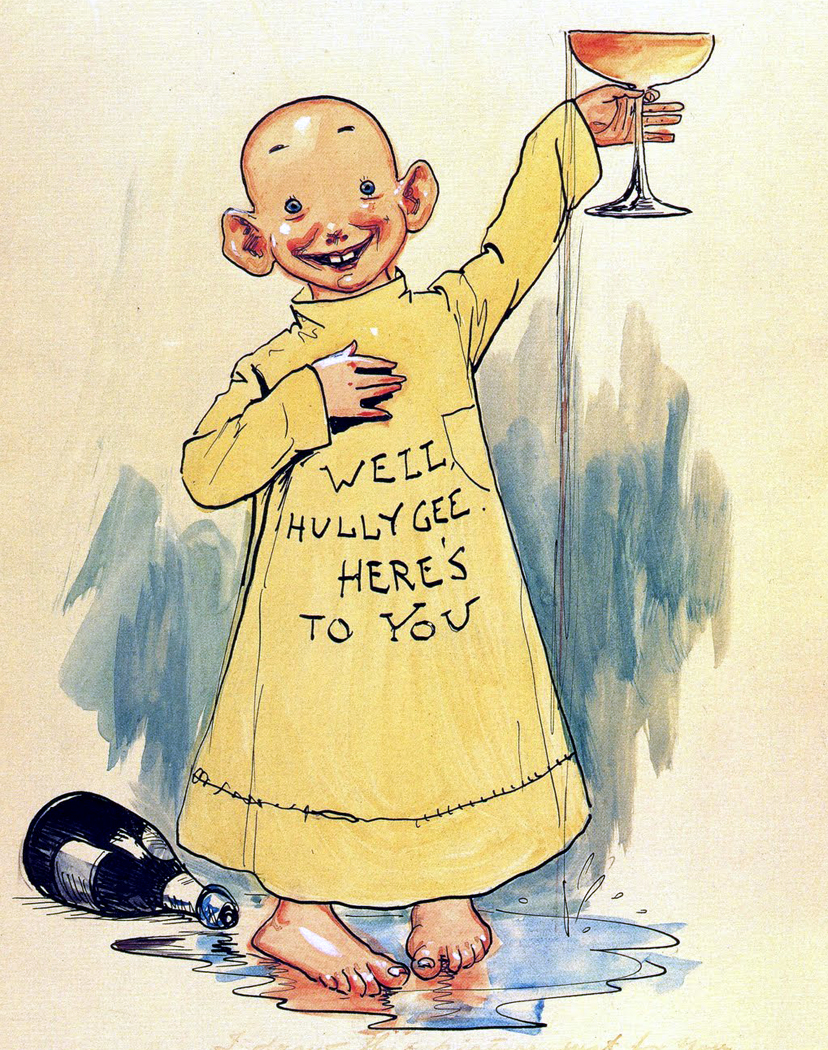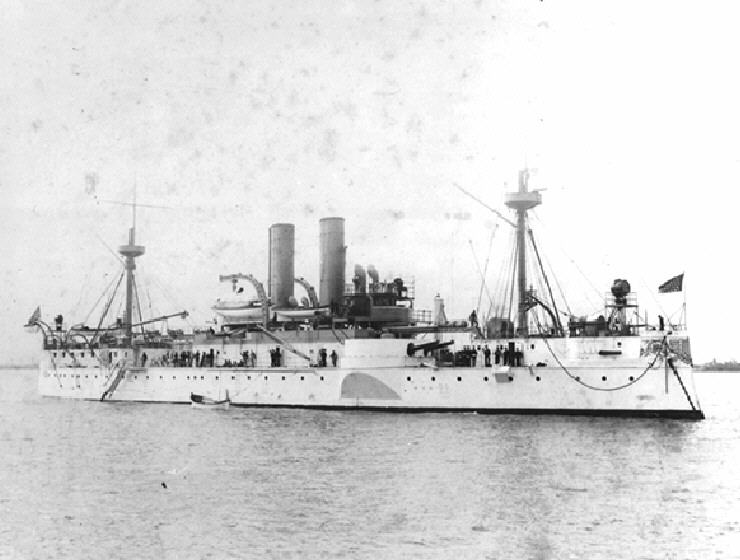|
De Lôme Letter
The De Lôme Letter, a note written by Señor Don Enrique Dupuy de Lôme, the Spanish Ambassador to the United States, to Don José Canalejas y Méndez, the Foreign Minister of Spain, reveals de Lôme’s opinion about the Spanish involvement in Cuba and US President McKinley’s diplomacy. Publication Cuban revolutionaries intercepted the letter from the mail and released it to the Hearst press, which published it on February 9, 1898, in the ''New York Journal'', in an article titled "Worst Insult to the United States in its History." Much of the press in New York began to demand De Lôme's resignation, and Hearst's ''New York Journal'' began a "Go Home De Lôme" campaign. These campaigns did, ultimately, lead to De Lôme's resignation. De Lôme’s unflattering remarks about McKinley helped stoke the flames that would become the Spanish–American War. Two months later, on April 11, 1898, McKinley delivered a war message to Congress suggesting "forcible intervention" by the U ... [...More Info...] [...Related Items...] OR: [Wikipedia] [Google] [Baidu] |
Enrique Dupuy De Lôme
Enrique Dupuy de Lôme (August 23, 1851 – July 1, 1904) was a Spanish ambassador to the United States. In the De Lôme Letter, he mocked U.S. President William McKinley, attacked McKinley's policies, and regarded McKinley as a weak president. Cuban rebels intercepted the letter, and on February 9, 1898, the letter was published in US newspapers. That contributed to the Spanish–American War , partof = the Philippine Revolution, the decolonization of the Americas, and the Cuban War of Independence , image = Collage infobox for Spanish-American War.jpg , image_size = 300px , caption = (clock ..., which started on April 25, 1898. Dupuy de Lôme was appointed Minister from Spain to the United States for the second time in May 1885. He was also Commissioner to the Columbian Exposition. His wife and the Duchess of Veragua represented the Queen Regent of Spain at this exposition. Dupuy de Lôme had large diplomatic experience, having ... [...More Info...] [...Related Items...] OR: [Wikipedia] [Google] [Baidu] |
José Canalejas Y Méndez
José Canalejas y Méndez (31 July 1854 – 12 November 1912) was a Spanish politician, born in Ferrol, who served as Prime Minister of Spain. Early life Son of a railway engineer, politician and editor of the newspaper '' El Eco Ferrolano '' José Canalejas y Casas and of María del Amparo Méndez Romero. He moved with his family to Madrid, and in October 1867 he enrolled in the Instituto San Isidro, "because at that time the incorporated schools could not teach the last two years of the six who made up the baccalaureate ». Already at the Central University of Madrid, he obtained the degrees of Law in 1871 and Philosophy in 1872, and the degree of doctor in both faculties. In 1873 he was assistant professor, but failed in two chair examinations, so he left teaching. He joined the company of the Railways of Madrid to Ciudad Real and Badajoz, where he became secretary general and He defended the company as a lawyer in lawsuits with other Spanish railway companies. Politi ... [...More Info...] [...Related Items...] OR: [Wikipedia] [Google] [Baidu] |
William McKinley
William McKinley (January 29, 1843September 14, 1901) was the 25th president of the United States, serving from 1897 until his assassination in 1901. As a politician he led a realignment that made his Republican Party largely dominant in the industrial states and nationwide until the 1930s. He presided over victory in the Spanish–American War of 1898; gained control of Hawaii, Puerto Rico, the Philippines and Cuba; restored prosperity after a deep depression; rejected the inflationary monetary policy of free silver, keeping the nation on the gold standard; and raised protective tariffs to boost American industry and keep wages high. A Republican, McKinley was the last president to have served in the American Civil War; he was the only one to begin his service as an enlisted man, and end as a brevet major. After the war, he settled in Canton, Ohio, where he practiced law and married Ida Saxton. In 1876, McKinley was elected to Congress, where he became the Republican e ... [...More Info...] [...Related Items...] OR: [Wikipedia] [Google] [Baidu] |
Cuban Junta
The Cuban Junta was a group of Cuban nationalists that advocated for Cuban independence before and during the Spanish-American War (April 21 – August 13, 1898). The Junta was primarily made up of naturalized Cubans located in the United States. The main goal of the Junta was to free Cuba from the Spanish Empire by securing financial and military aid from the United States. The Junta used the American press as a device to distribute propaganda on Spanish rule in Cuba, fostering support among American citizens. The deciding factor that sent the United States into the Spanish-American War was the publication of the De Lôme Letter by the revolutionaries of the Cuban Junta. The letter was written by the Spanish ambassador to the United States, Enrique Dupuy de Lôme, and was very critical of President William McKinley The publication of the letter heightened tensions between the United States and Spain, and President McKinley was forced to confront Spain; he did so in demanding that C ... [...More Info...] [...Related Items...] OR: [Wikipedia] [Google] [Baidu] |
William Randolph Hearst
William Randolph Hearst Sr. (; April 29, 1863 – August 14, 1951) was an American businessman, newspaper publisher, and politician known for developing the nation's largest newspaper chain and media company, Hearst Communications. His flamboyant methods of yellow journalism influenced the nation's popular media by emphasizing sensationalism and human interest stories. Hearst entered the publishing business in 1887 with Mitchell Trubitt after being given control of ''The San Francisco Examiner'' by his wealthy father, Senator George Hearst. After moving to New York City, Hearst acquired the '' New York Journal'' and fought a bitter circulation war with Joseph Pulitzer's '' New York World''. Hearst sold papers by printing giant headlines over lurid stories featuring crime, corruption, sex, and innuendos. Hearst acquired more newspapers and created a chain that numbered nearly 30 papers in major American cities at its peak. He later expanded to magazines, creating the largest ne ... [...More Info...] [...Related Items...] OR: [Wikipedia] [Google] [Baidu] |
New York Journal-American
:''Includes coverage of New York Journal-American and its predecessors New York Journal, The Journal, New York American and New York Evening Journal'' The ''New York Journal-American'' was a daily newspaper published in New York City from 1937 to 1966. The ''Journal-American'' was the product of a merger between two New York newspapers owned by William Randolph Hearst: The ''New York American'' (originally the ''New York Journal'', renamed ''American'' in 1901), a morning paper, and the ''New York Evening Journal'', an afternoon paper. Both were published by Hearst from 1895 to 1937. The ''American'' and ''Evening Journal'' merged in 1937. History Beginnings ''New York Morning Journal'' Joseph Pulitzer's younger brother Albert founded the ''New York Morning Journal'' in 1882. After three years of its existence, John R. McLean briefly acquired the paper in 1895. It was renamed ''The Journal''. But a year later in 1896, he sold it to Hearst.(23 June 1937)Hearst to Merge New York ... [...More Info...] [...Related Items...] OR: [Wikipedia] [Google] [Baidu] |
Spanish–American War
, partof = the Philippine Revolution, the decolonization of the Americas, and the Cuban War of Independence , image = Collage infobox for Spanish-American War.jpg , image_size = 300px , caption = (clockwise from top left) , date = April 21 – August 13, 1898() , place = , casus = , result = American victory *Treaty of Paris (1898), Treaty of Paris of 1898 *Founding of the First Philippine Republic and beginning of the Philippine–American War * German–Spanish Treaty (1899), Spain sells to Germany the last colonies in the Pacific in 1899 and end of the Spanish Empire in Spanish colonization of the Americas, America and Asia. , territory = Spain relinquishes sovereignty over Cuba; cedes Puerto Rico, Guam and the Philippine Islands to the United States. $20 million paid to Spain by the United States for infrastructure owned by Spain. , combatant1 = United State ... [...More Info...] [...Related Items...] OR: [Wikipedia] [Google] [Baidu] |
Yellow Journalism
Yellow journalism and yellow press are American terms for journalism and associated newspapers that present little or no legitimate, well-researched news while instead using eye-catching headlines for increased sales. Techniques may include exaggerations of news events, scandal-mongering, or sensationalism. By extension, the term ''yellow journalism'' is used today as a pejorative to decry any journalism that treats news in an unprofessional or unethical fashion. In English, the term is chiefly used in the US. In the UK, a roughly equivalent term is ''tabloid journalism'', meaning journalism characteristic of tabloid newspapers, even if found elsewhere. Other languages, e.g. Russian ( Жёлтая пресса), sometimes have terms derived from the American term. A common source of such writing is called checkbook journalism, which is the controversial practice of news reporters paying sources for their information without verifying its truth or accuracy. In some countries it ... [...More Info...] [...Related Items...] OR: [Wikipedia] [Google] [Baidu] |
1898 In International Relations
Events January–March * January 1 – New York City annexes land from surrounding counties, creating the City of Greater New York as the world's second largest. The city is geographically divided into five boroughs: Manhattan, Brooklyn, Queens, The Bronx and Staten Island. * January 13 – Novelist Émile Zola's open letter to the President of the French Republic on the Dreyfus affair, ''J'Accuse…!'', is published on the front page of the Paris daily newspaper ''L'Aurore'', accusing the government of wrongfully imprisoning Alfred Dreyfus and of antisemitism. * February 12 – The automobile belonging to Henry Lindfield of Brighton rolls out of control down a hill in Purley, London, England, and hits a tree; thus he becomes the world's first fatality from an automobile accident on a public highway. * February 15 – Spanish–American War: The USS ''Maine'' explodes and sinks in Havana Harbor, Cuba, for reasons never fully established, killing 266 me ... [...More Info...] [...Related Items...] OR: [Wikipedia] [Google] [Baidu] |
1898 In Spain
Events from the year 1898 in Spain. Incumbents * Monarch – Alfonso XIII * Prime Minister – Práxedes Mateo Sagasta * Foreign Minister – José Canelejas * Ambassador to the United States: Enrique Dupuy de Lôme Events * February 9 – publishing of the De Lôme Letter * March 27 – Spanish general election, 1898 * April 11 – U.S. president William McKinley asks the U.S. Congress to declare war on Spain * April 25 – beginning of Spanish–American War * July 1 – Spanish–American War: Battle of El Caney * July 3 – Spanish–American War: Battle of Santiago de Cuba * December 10 – Treaty of Paris (1898) * founding of Athletic Bilbao * founding of Palamós CF Births * April 26 – Vicente Aleixandre * June 5 – Federico García Lorca * July 27 – Concha Méndez * October 22 – Dámaso Alonso Deaths * July 1 – Joaquín Vara del Rey y Rubio * July 3 – Fernando Villaamil References 1898 in Spain, 1890s in Spain Years of the 19th century in Spain {{ ... [...More Info...] [...Related Items...] OR: [Wikipedia] [Google] [Baidu] |






